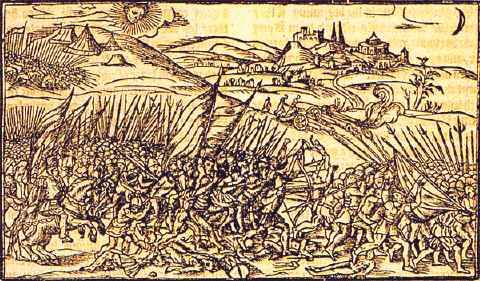The end of Richard's reign
Soon after gaining the throne, Richard's ally, the ambitious Duke of Buckingham, led a rebellion, intending to put Henry Tudor on the throne. Richard reacted speedily, crushing the rebellion, and executing Buckingham.
Richard's reign was made unstable by the death of his wife and only son, leaving him with no heir. The rumoured fate of the "Princes in the Tower"--Edward V and his brother--also bred a lingering distrust* of the latest usurper king.
One clear quality in Richard's favour, admitted even by his enemies, was his bravery and competence in battle; thus, for all the blackening of his name afterwards, his death in arms at Bosworth is a striking reminder of the most admired characteristic of the Plantagenets--their preeminence as strong warrior-kings*. Richard III was the last representative of a successful dynasty stretching back almost to the Norman Conquest, and Henry Tudor's victory was by no means an occasion for universal rejoicing*.
Footnotes
-
Rumours . . .
Following the death of the Queen, the rumour Richard had poisoned her to marry his niece Elizabeth of York became so rampant that he had to issue a public denial on both counts.
-
Richard III, warrior-hero?
". . . his courage also high and fierce, which failed him not in the very death, which, when his men forsook him, he rather yielded to take [be taken] with the sword, than by foul flight to prolong his life, uncertain what death perchance soon after by sickness or other violence to suffer"
(Polydore Vergil).He had a proud mind and an arrogant stomach, the which accompanied him even to his death, rather choosing to suffer the same by dint of sword than, being forsaken and left helpless of his unfaithful companions, to preserve by cowardly flight such a frail and uncertain life which, by malice, sickness, or condign [deserved] punishment, was like shortly to come to confusion.
(Holinshed, describing the reign of Richard III). -
Sympathy for Richard
King Richard, late mercifully reigning upon us, . . . with many other lords and nobility of these northern parts, was piteously slain and murdered, to the great heaviness of this city
(York Records).
